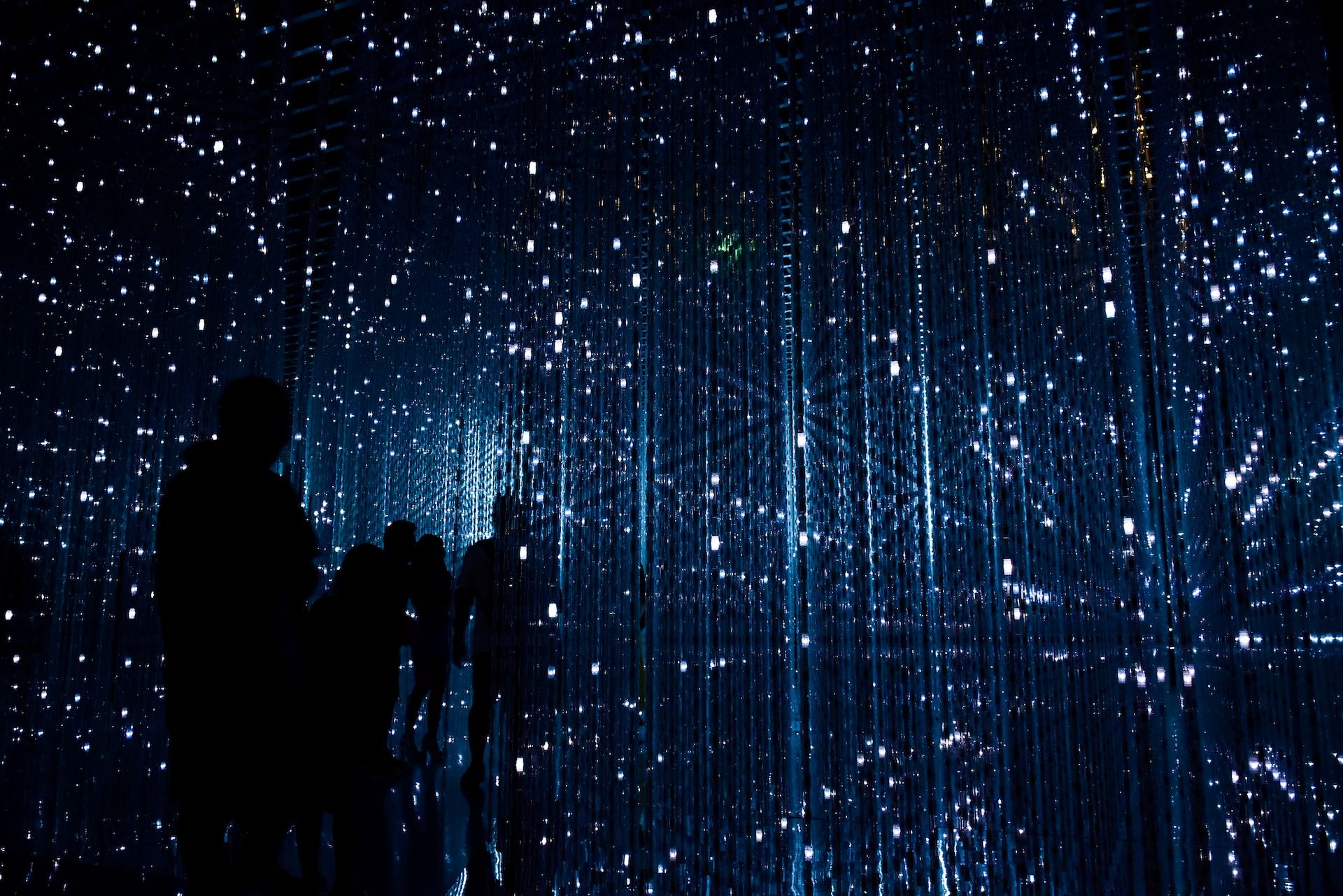In the last year, tech developments have rocketed. Artificial Intelligence (AI) is a hot topic in every industry, 40% of organisations will increase their investment in AI overall because of advances. As thousands of businesses integrate it into their ways of working, it’s inevitably going to roll into events in a big way.
It might seem daunting, but knowing how to use AI to help plan and deliver events is a huge boost for event planners. The opportunities for creating otherworldly experiences, bringing in sponsorship, and streamlining the planning process all offer a chance to make your events seriously exceptional - without an exceptional effort!
In this article, we’re digging into the developments in AI and its potential impacts on future events, and looking at ways that eventprofs can stay ahead of the curve. But first and foremost…
What is AI?
AI, or Artificial Intelligence, is a technology that makes machines capable of doing tasks that usually require human thinking. It allows computers to learn from data and improve their performance over time.
It might sound like a futuristic concept, but the chances are you’ve interacted with AI many times already today, from using Siri or Alexa to carry out tasks, Google Maps to calculate your route to a meeting, or buying a new pair of trainers, air fryer, or sushi-making course online. Netflix, Google, and social media platforms all use AI to show you the content most relevant to you - so blame AI next time you get stuck in an Instagram rabbit hole!
What are the impacts of AI on events and the events industry?
In the events industry, AI is finding a whole range of uses, from engaging attendees to ensuring security. It can analyse attendee data, predict risks, and automate tedious budget planning, making eventprofs’ lives much easier, and taking the guesswork out of events.
There are endless areas where AI is having a huge impact and countless ways in which to use it, but we’re sharing just a few of the use cases where we see it has the biggest impact on events, and in which we think eventprofs should be investing time in learning.
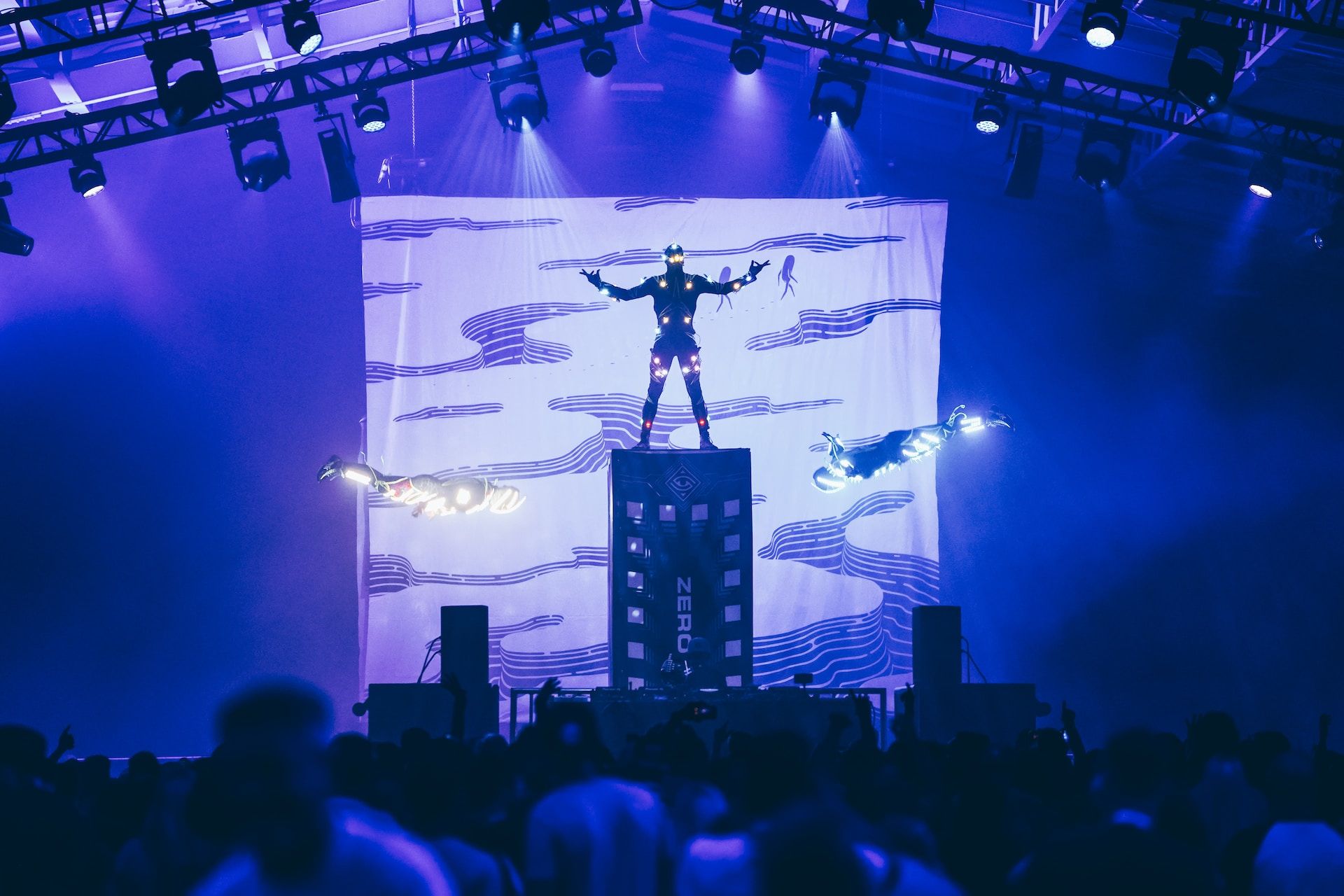
AI for Streamlining Event Planning and Management
In the fast-paced world of events, time is of the essence. Efficiency is essential to getting work done on time and to budget, and AI is fast emerging as a powerful ally in this area, helping to streamline event planning and management processes and cutting out wasted time for planners.
Enhancing efficiency and reducing errors
AI's ability to crunch numbers and interpret huge amounts of data makes it a really valuable asset for minimising errors in event logistics. It can calculate budgets, create critical event plans, and even plan staffing schedules to optimise security, manage break times, and not leave any corner unattended. Technologies are cropping up all the time to do this, but ChatGPT is one of the most accessible and affordable AI platforms out there currently.
AI-powered event-sourcing tools
AI tools like ChatGPT offer a way to quickly and easily get tailored recommendations for your event, from sponsors to speakers.
One of the most time-consuming parts of event sourcing is finding a venue, but times are changing. Gone are the days of sifting through dozens of venues and waiting days or weeks to have one confirmed: venue platforms like Hire Space are leveraging machine learning algorithms to help event organisers connect with relevant venues quickly (and even book them instantly), massively simplifying the venue selection process.
If you take a look at our venue search tool, you’ll find that the recommendations you get for venues are aligned with what you need without you having to enter a full brief: this is because our search engine uses machine learning to recognise your requirements and predict everything from amenities and layout to accessibility and parking options - faster than you could think of them yourself!
Predicting catering quantities and staffing needs
AI's capabilities extend far beyond venue selection; we’re also anticipating that it’ll play a crucial role in predicting event needs. By analysing historical data from past events, AI algorithms can make accurate predictions about the required venue size, catering quantities, and staffing needs. This helps event professionals to make data-driven decisions, reducing the likelihood of overspending and wastage (we’ll come back to that later!).
AI for on-day event management
When it comes to the day of your event, event managers are often too stretched to be able to oversee everything happening at once. AI can be useful for setting up agendas and schedules, delegating tasks, and writing briefs to ensure everyone knows what they should be doing. This can even get down to the nitty-gritty, like writing shot lists of videos and photo footage to record. However, this is an area where a human is essential, as AI can’t problem solve like an event prof!
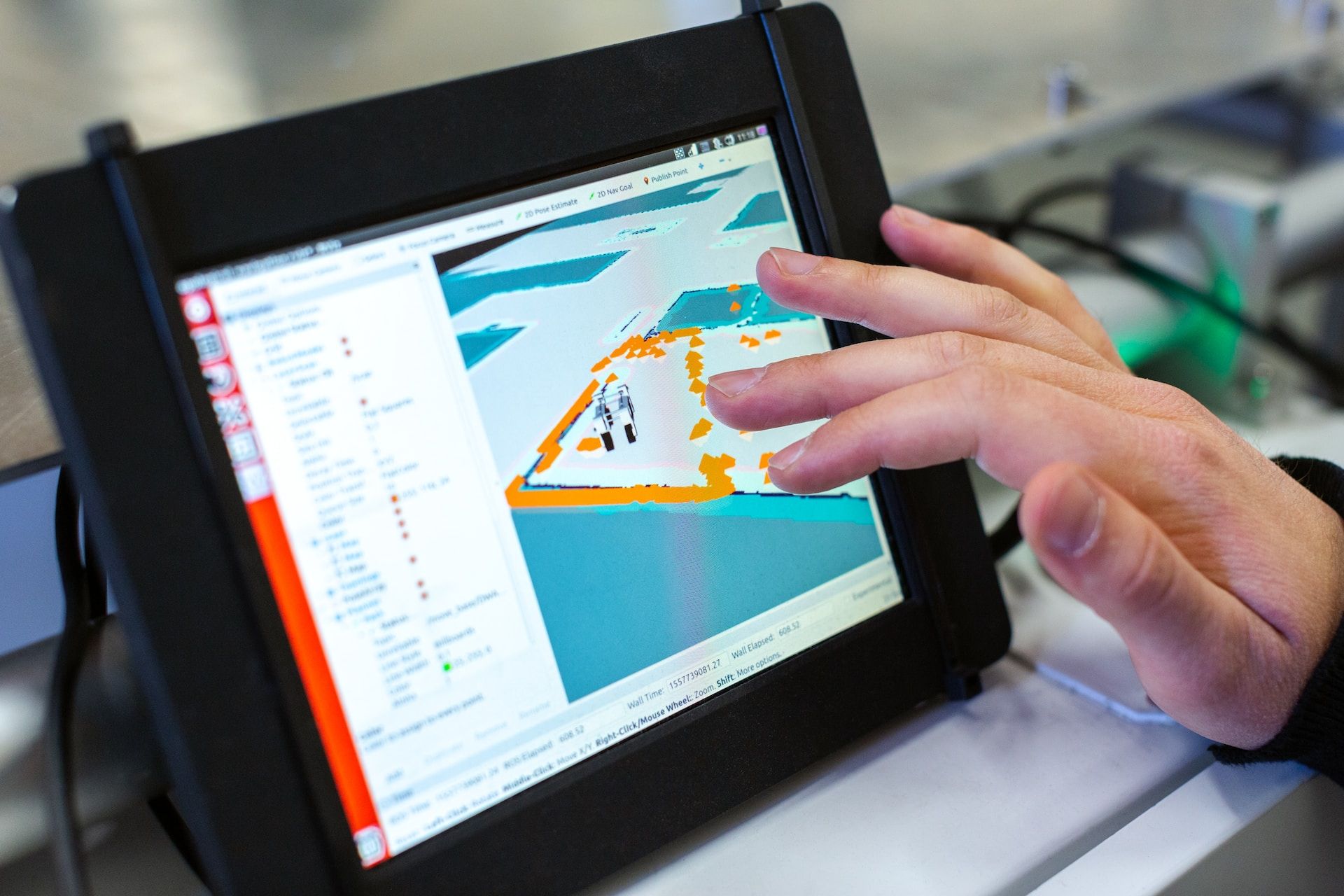
Analysing and highlighting risks
It’s near impossible to anticipate every potential hazard in events - for a human, at least (even one with years of event experience). With input from previous events, AI tools like PredictHQ and ChatGPT can anticipate attendee flow and optimise event layouts to make sure that the right routes and safety measures are put ensure that the right routes and safety measures are implemented to keep everyone safe.
By allocating event staff to higher-risk areas based on the AI's insights, organisers can ensure smooth event operations and safeguard attendees.
Real-world example: AutonomousXP
A recent example of AI's potential in event planning and management can be found in the case of AutonomousXP, an event that’s been almost entirely planned by an AI tool. As an experiment, the event organisers entrusted the AI system to handle the critical planning tasks of the event, including venue selection, staff allocation, content planning and speaker selection, and scheduling.
What does this mean for eventprofs?
We know that situations like this may well be worrying for eventprofs, but the reality is that Autonomous XP couldn’t have been dreamed up without the creativity of the event organisers. We don’t anticipate there being a time when event organisers aren’t an indispensable part of the creation of events, but we think that adopting AI now to help make your events more streamlined is the best way to stay competitive and ahead of the curve! Below are some ways to do this.
AI in Event Content and Experience Curation
At the heart of every successful event is content that captivates attendees, but in this digital age, it’s harder than ever to stand out and grab the attention of your target audience.
AI is playing an increasingly important role in suggesting and crafting compelling event content and curating experiences that leave a lasting impact on attendees. Here are a few of the ways it’s doing this:
AI for content suggestions
AI can be used to recommend specific topics, speakers, and formats based on target attendees' profiles, making it easier for event organisers to build an agenda that's relevant to their audience.
AI for social listening
AI tools like Sprinklr can be used to analyse vast amounts of data, including social media conversations, online discussions, and industry trends, to identify potential topics that will resonate with the target audience. This "social listening" allows eventprofs to tap into the pulse of their attendees, gaining valuable insights into their preferences, interests, and pain points. Armed with this data, it’s a lot easier for eventprofs to make the right calls on what content to stage at their events.

Personalisation at scale
By harnessing attendee data, AI algorithms can create personalised content recommendations for each participant. Ticketing platforms like Eventbrite already use algorithms to analyse past attendance data and demographic behaviours to recommend events that align with individual attendees' tastes and preferences. We predict that this will expand into individual events soon, with personalised content and networking suggestions.
What will this look like in practice?
We’re envisioning event apps suggesting sessions, workshops, or networking opportunities in real-time that align with attendees' behaviours (think of it like Netflix’s algorithms that say "We think you'll enjoy X") with instant suggestions for workshops or exhibitors to meet based on stands you’ve just interacted with. This personal touch fosters higher engagement for individual attendees - they’re likely to feel more catered for and rate the event experience higher if they feel the event has delivered real, tangible, bespoke value for them.
Picture the scene: you’re at a conference and exhibition for the travel industry. You haven’t signed up for any sessions but you’re interested in sustainability and decide on the day to attend a session on greener aviation fuels. After recognising that you’ve attended this session from your wearable technology (we’ll come onto this later), your event app suggests a series of exhibitors to meet, and offers a couple of other sessions you might be interested in - let’s say on consolidated transportation and environmental business travel - and a networking session happening for attendees interested in green travel, which you decide to go to later on.
You’re likely to be much more engaged with the content and feel far more positive about the event than if you’d been left with a difficult-to-navigate event schedule and a vague idea of exhibitors. It’s a win-win for everyone involved!
AI for Increasing Attendee Engagement
With shorter attention spans and more competition for loyalty than ever before, it’s essential to keep attendees interested in your content. We see AI proving to be a game-changer for encouraging attendees to participate and immerse themselves in event experiences.
Using AI for gamification
Gamification is a great way to increase engagement at events, and AI brings more potential for this than ever. The possibilities are endless: from creating a persona-driven scavenger hunt around the event floor (if we’re going big, think Pokemon Go, with items to collect through integrated AR), to having codeword guessing games to allow access to VIP areas - see Gandalf AI for an example of how AI can keep you on your toes!
AI avatars and match-making for personalised conversations
AI avatars are already making waves in contexts like the Metaverse, but they can also be used in hybrid events to bring guests together for networking based on shared interests. These avatars can show attendees' interests and preferences, allowing others to send messages based on their profiles by way of introduction (a cross between a dating app and Sims!). By analysing attendees' profiles and behaviour, AI avatars can suggest like-minded individuals for networking opportunities, leading to much more enriching attendee connections.
Real-time analysis through wearable event tech
Wearable techs, such as RFID wristbands or badges, are becoming more prevalent in exhibitions and can give event organisers valuable insights into attendee behaviour in real-time. By tracking attendee movement around the event floor, AI algorithms can conclude traffic patterns optimise services like food and beverage distribution based on demand, and make adjustments to routes and timings based on the flow of attendees.
The data gathered from this tech can also be used to form conclusions post-event, with AI shaping huge amounts of data into insights on audience behaviours and interests. This can be taken forward to help plan for the next event.
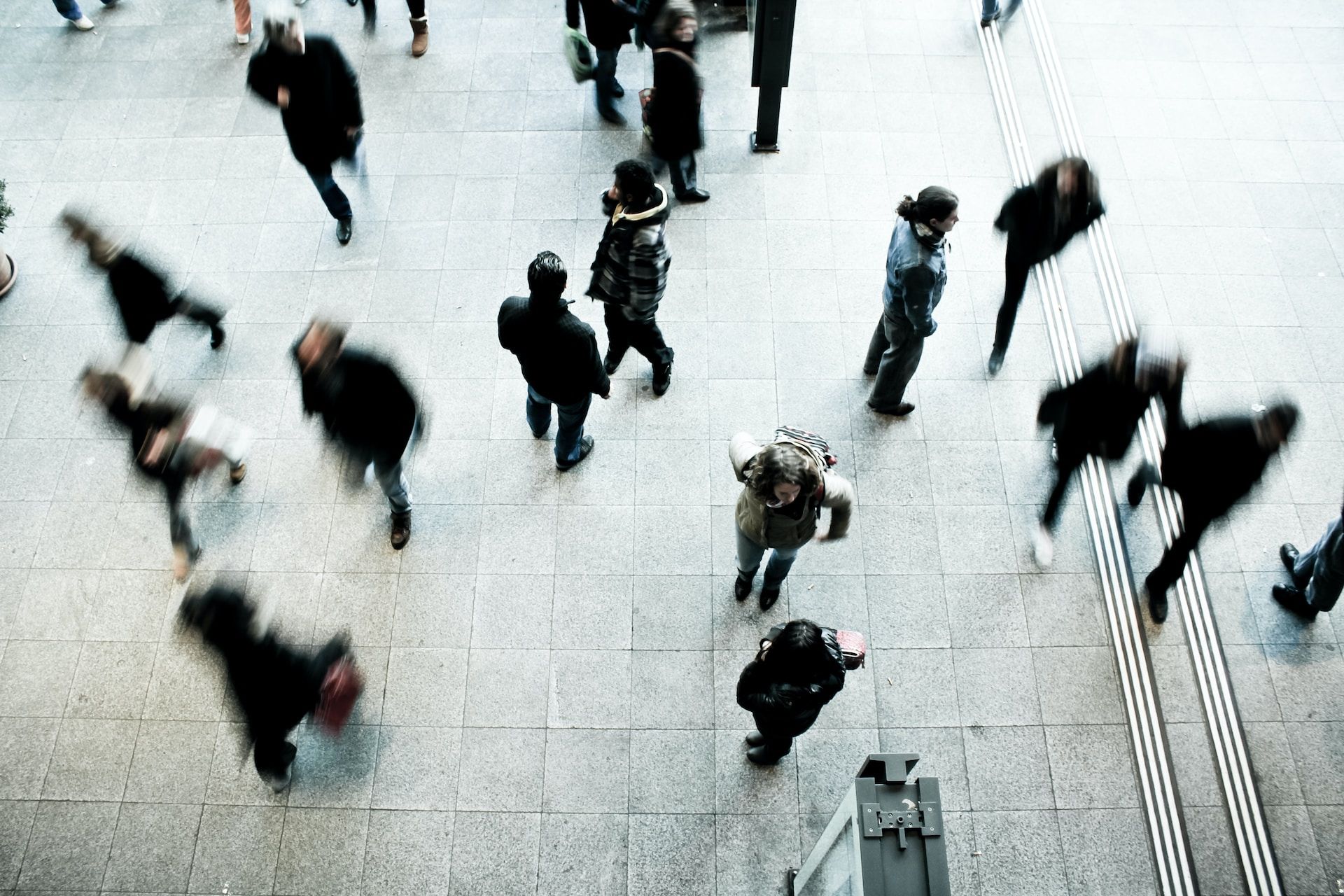
AI-powered chatbots and virtual assistants
Chatbots are one of the most familiar applications of AI in daily life, and they're getting better all the time. These human-simulating systems can answer queries, guide attendees through the event schedule, and offer personalised recommendations, enhancing the event experience.
AI for Driving Event Marketing and Promotion
In the increasingly competitive landscape of event marketing, AI is transforming the way events are promoted. Here are some of the ways we see this happening.
AI-created content for more streamlined marketing
Perhaps the most obvious and most effective way of using AI is in AI-generated content. Every event marketer knows that crafting copy and communications - not to mention the content abstracts and panel questions - is a laborious process. A recent study by Harvard and Stanford University researchers suggests that using AI makes professionals 40% more productive when it comes to writing tasks - that’s 40% of your precious time you can get back to focus on making the event exceptional!
Content creation is where AI is a particularly useful tool to have in your toolkit: it can craft compelling, relevant, and, most importantly, consistent, content, from press releases and social media posts to emails, speaker bios, and landing pages. In tests, ChatGPT produced some tight, consistent copy for everything from emails, including early bird announcements and sponsor proposals, to questions for the particular set of speakers we gave it, on a certain panel topic.
Some of the best tools for this include ChatGPT, Jasper AI, and CopyAI, which all allow eventprofs to craft copy for various channels in minimal time with maximal impact.
Creating AI-led videos for lead generation
Video is king today: 91% of businesses use video as a key tool for marketing, and viewers retain 95% of a message when they watch it in a video compared to just 10% when it's presented to them in written format.
Platforms like HeyGen can also be used to create AI-generated videos for event marketing, from tailored personalised video invitations to teaser trailers for content, and wrap-up videos after the event. You can select an AI avatar, input a script (the creation of which can, of course, be supported by AI), and create customised invitations for each of the personas on your target attendee list. Then, just embed them in an email, or use them in your ads - no cameras, lights, or action needed!
Incorporating AI-generated art and visuals into event design
If you don’t have an in-house designer, it’s possible to make some pretty mind-blowing AI-generated art and visuals for event branding and design or make tweaks to improve on the visuals you already have. Platforms like DALL-E, Fotor, and Microsoft Designer can produce custom visuals based on event themes, brand elements, and attendee preferences. These AI tools can translate a marketing concept into a real visual identity for an event - something that all eventprofs know takes a long time!
Popular marketing design tools like Canva are also bringing in AI to make the design process even easier - so there's no reason you can't make your event invitations out-of-this-world!
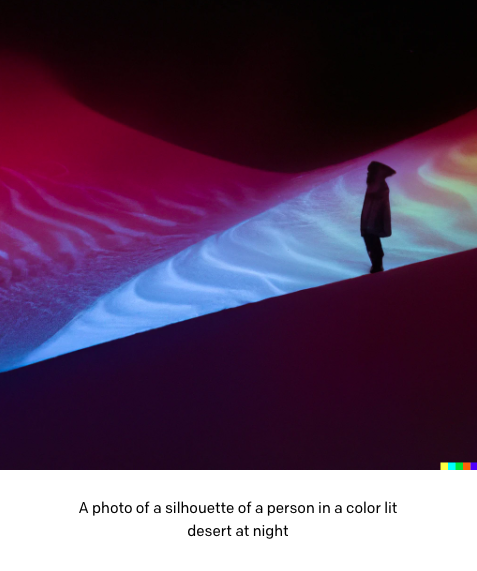
AI-driven audience segmentation and targeted marketing campaigns
AI algorithms identify patterns and preferences among potential attendees, through social listening and analysing past behaviours. This allows event organisers to segment their audience more effectively and create targeted marketing campaigns tailored to specific demographics.
This could involve promoting different content sessions to different audiences, or even having slightly different event branding for a corporate buyer versus someone who’ll attend for entertainment - AI can identify and segment these target types much more effectively than a human can.
Leveraging AI for social media sentiment analysis
As we’ve already mentioned, AI-powered social listening is a hugely valuable tool for coming up with event content, but it can also capture how audiences are responding to your event marketing.
AI-driven tools like Devi AI can monitor social media conversations, providing real-time insights into audience sentiments and reactions. This allows event organisers to understand attendees' expectations and tailor their messaging to resonate better with the audience.
Drawing data-driven insights for improved marketing strategies
AI provides event organisers with data-driven insights derived from click-through rates, engagement metrics, and other analytics. These insights help to shape an understanding of what the audience is looking for when it comes to events and to refine marketing strategies. By relying on data rather than assumptions, event marketers can make informed decisions that maximise their marketing impact.
Chatbot-driven lead generation for business development
Chatbots have become really important add-ons to event promotion. By engaging with potential attendees in real-time, chatbots can answer queries, provide event details, and even assist with registration processes. This personalised approach helps to improve lead conversion and generate customer loyalty.
Chatbot models like LivePerson are being trained to respond to queries with increasingly human answers and provide really useful guidance while promoting the business and events to prospects. You can train these tools to promote an event in natural ways, leading on from queries about other interests or information they are looking for.
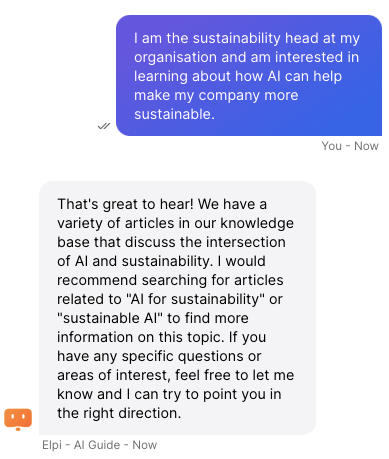
AI for Enhancing Event Security and Safety
In an era where ensuring event security and attendee safety is an ever-growing concern, AI is emerging as a critical ally for event organisers. With AI-powered insights, event professionals can anticipate hazards long before they become an issue and put measures in place to keep guests safe from the minute they walk through the event doors. Here are some areas we see being positively impacted by integrating AI.
Predictive analytics for identifying likely risk areas
As we mentioned earlier, by analysing data from previous events, crowd behaviour, and the layout of the venue, AI algorithms can highlight areas where potential risks may arise - like the corridor that no one’s thought to separate to be a catering route only! Event organisers can then put measures in place preemptively to minimise potential threats without stretching security personnel on the day.
Facial recognition and biometrics with AI and machine learning
AI-powered facial recognition and biometric (such as fingerprint scanning) technologies are controversial topics currently, but their implementation in events could have real benefits. These systems can identify individuals from huge databases in real-time, verifying attendees and staff at entry points to events. By cross-referencing data with watchlists, AI can detect potential security threats and prevent unauthorised access to restricted areas.
However, some claim that they represent an invasion of privacy and have the potential to leak sensitive data about attendees. This is an area we expect to see becoming a critical part of events in the future, but it’s going to take regulations being in place before we see this one rolling out on a large scale.
AI-powered crowd monitoring
AI-driven crowd-monitoring systems are used by security forces and police around the world, and we predict that they’ll also have an important role in identifying potential risks during events. By analysing crowd behaviour, density, and movement patterns, AI algorithms can detect anomalies or signs of unrest, and relay this information to security personnel. As we all know, in events you have to respond to risks immediately, so having AI to help identify any hazards swiftly is a major help.
AI password recognition for cybersecurity
High-profile events are often targets for cybersecurity threats, as we saw many times during Covid when most events were held online… AI-powered password recognition systems add an extra layer of defence against unauthorised access by analysing patterns and behaviours of individuals attempting to guess passwords. Plus, AI companies are working on anti-hacking protocols, which will keep data safer from hackers by allowing the security walls to build their own defences in response to attempts to hack into it.

AI for Championing Accessibility
In the past few years, we’ve seen inclusivity and accessibility becoming essential pillars of successful events (it’s about time!), with eventprofs emphasising ensuring that all attendees, regardless of their abilities, can fully participate in the event. AI has a huge potential for making this facet of events easier at scale, and we’re excited to see where this takes us. Here are just a few of the potential areas where we see it accelerating a transition to accessibility:
Identifying potential blockage areas
AI-powered crowd monitoring can identify potential blockage areas and bottlenecks, ensuring that event spaces remain easily accessible and navigable for wheelchair users and those with mobility challenges.
AI-powered closed captioning and language translation
AI-driven closed captioning (like IBM’s and Interprefy’s solutions) has already started revolutionising event accessibility for individuals with hearing impairments. By automatically transcribing speech into text in real-time, AI enables deaf and hard-of-hearing attendees to follow presentations and discussions effortlessly. Additionally, language barriers are no longer an impediment to event participation, thanks to AI-powered language translation providing real-time translation services.
This is a really exciting concept for eventprofs - suddenly your content can be available to hundreds of times the number of customers, in the language they understand! Check out some of the tools making this possible, like KUDO, Interprefy, and - for a glimpse into the future, Meta’s ‘No Language Left Behind’ project, which translates over 200 languages, without having to go through English as a common tongue.
AI-powered chatbots for event apps
Everyone wants to know that they’ll be able to attend and participate in an event before they arrive, but not everyone is confident or able to ask about access requirements over email or the phone. Chatbots can be excellent facilitators to allow these discussions to happen and to relay information between organisers and attendees, as long as they’re set up correctly.
We see the use of chatbots becoming far more of a priority in events over the next few years, as eventprofs look to include all attendees as far as possible.
AI as a real-time audio guide
Even more revolutionary for events, as AI continues to advance, we see it acting as a real-time audio guide through the venue. Attendees could receive personalised instructions and information, including navigational guidance, event schedules, and updates on activities in different areas. This AI-powered audio guide could become a game-changer for visually impaired individuals, providing them with a more immersive and independent event experience.
While there are plenty of audio guide tools out there, we can’t find anything about using it for wayfinding yet - looks like a gap in the market that’s waiting to be explored!!
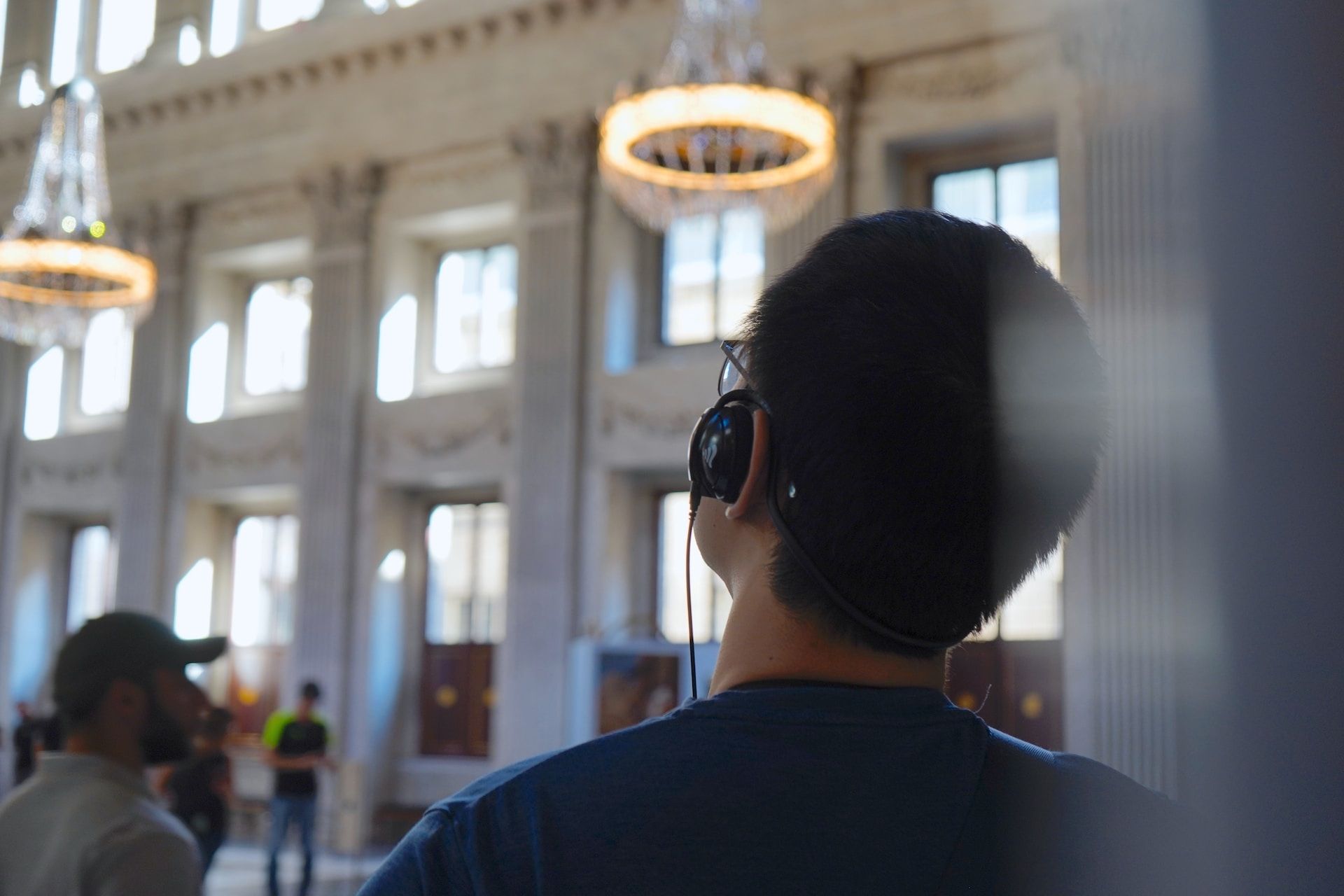
AI for ensuring accessibility across event sites
An event experience starts long before the on-the-day section: the attendees' journey could see them visiting emails, landing pages, social media channels, and more before signing up for the event, and they must have a positive experience every step of the way. Many AI models can develop websites from a simple brief provided, including incorporating accessibility in all facets of the website, from image alt text to accessible layouts.
Real-time data analysis for event-floor adjustments
AI's ability to analyse data in real-time empowers event organisers to make immediate adjustments for improved accessibility on the day. For instance, AI can detect bottlenecks in audience movement and suggest alternative pathways to ensure a smooth flow (imagine digital signs that change based on the best flow for attendees, like traffic signs). AI can also monitor lighting and sound levels, making real-time adjustments to accommodate attendees with sensory sensitivities, creating a comfortable environment for everyone.
Humans often overlook certain elements of accessibility, but a machine that’s programmed to calculate the optimum environment for all attendees has a much more objective starting point. By working with these tools, you can feed in the accessibility requirements your attendees have, or may have, and ensure that you cover all bases and give everyone a great experience - if that’s not a great example of using AI to make events better, we don’t know what is!
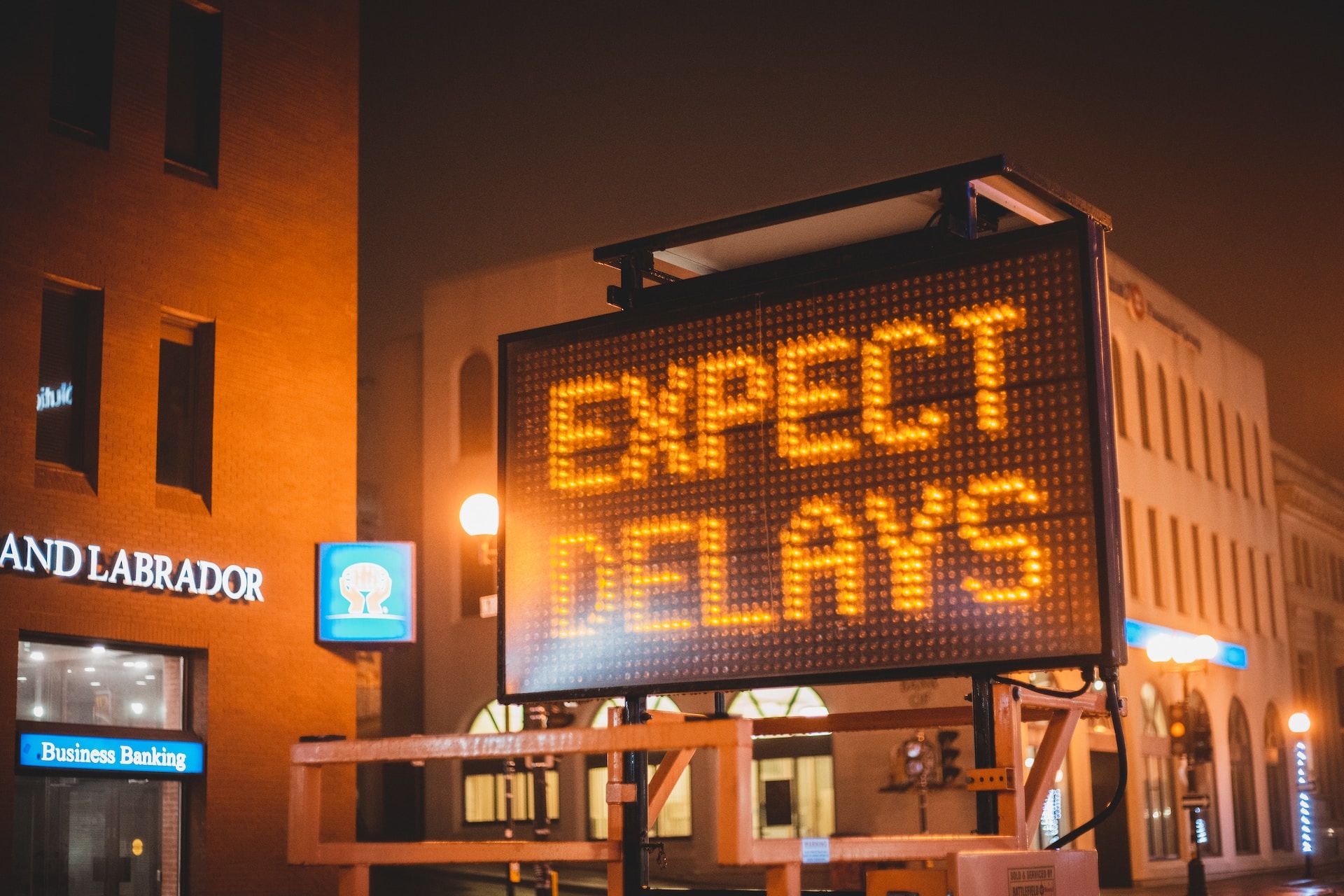
AI for Improving Sustainability
As the world increasingly embraces sustainability, the events industry also has to take significant steps to minimise its environmental footprint. By using AI for sustainable event management, we stand to make much better choices for the planet, from reducing waste to planning how to recycle and reuse materials.
AI predictive analytics for waste reduction
AI's predictive capabilities will prove invaluable in calculating the exact amount of catering and resources required for an event. By analysing historical data, attendee preferences, and consumption patterns, AI algorithms can forecast the demand for food and beverages (with a little human oversight - after all, a machine doesn’t always understand that some of your guests are there for the nibbles above all else!).
By working with AI, this data-driven approach ensures that event organisers order just the right amount of catering, reducing food waste and minimising environmental impact.
Planning the onward journey of materials
AI is going to play a vital role in identifying opportunities to reuse or repurpose materials used at events, such as exhibition stands and signage. From calculating what can be recycled and how many kilos of paper waste you’ll produce (for instance) so that you can factor recycling organisations like First Mile into your budget, to using AI to plan the onward journey of items, can go a long way in reducing waste and promoting a circular economy within the events industry.
Recommending environmentally friendly processes
AI's ability to process vast amounts of data allows it to recommend more environmental practices for event venues. From identifying the most energy-efficient heating and lighting solutions to making sure room occupancy and ventilation are optimised, AI tools can offer real-time recommendations to minimise energy consumption and reduce the event's overall environmental impact.
We’re all for having a tool to make recommendations - making an event even a little more sustainable can be a huge undertaking, but having some objectives to put in place makes it a lot easier to cut down where you can make a difference.

Challenges and Considerations of AI in Events
While AI holds huge potential for transforming the events industry, it’s not without its fair share of challenges. We haven’t dived too deeply into these here, as we’re looking at the opportunities for AI in events, rather than the drawbacks, but it’s important to touch on a few of the main considerations that eventprofs should be aware of when exploring AI.
Data privacy and ethical concerns
AI-driven solutions often rely on collecting and analysing large amounts of data, including personal information about attendees. Event organisers must handle this data ethically and comply with GDPR. This means that you should always obtain explicit consent for data usage from your attendees to keep their trust - and stay on the right side of the law!
If you're allowing an AI model to handle personally identifiable data, ensure you have read and understand their data privacy policies. AI models learn from every request that is made, so they will most likely store this data for their learning model. Most tools have the functionality to turn this off for specific requests, or you can remove any data that is personally identifiable from these data sets, identifying individuals by a unique identifier instead of personal information.
Overcoming biases and ensuring inclusivity
While AI can be great for increasing inclusion and accessibility, AI algorithms can have biases based on the data they’re trained on, leading to potential exclusions or skewed experiences for certain demographics. A recent example of this was someone asking an AI bot to turn a photo of them into a professional LinkedIn picture, only to have it turn her white with a different colour of eyes and hair...
As an event organiser, you should actively monitor AI systems for biases and take steps to make sure that you’re considering all attendees at your events. It can be a good idea to use a checklist of needs that attendees might have, to run through an AI tool (see our section on AI for Accessibility) to check that you haven’t missed anything.
Adapting to new skill requirements
Harnessing AI for event planning and management, and learning to understand the results, is another big change for event professionals, and isn’t something we’ll learn overnight.
Investing time into learning to use these new technologies can seem like a risk but we’ve been here before, and learnt to adapt to virtual and hybrid tech, and made our events stronger because of it. Some companies resisted the internet for years - now it’s the single greatest tool for efficiency that’s ever been developed!

Will events become robot-controlled?
We’ve heard plenty of claims that AI will make events less meaningful and authentic, which is a valid concern: can a machine understand human experiences? To that, we say - no, but it can predict them, categorise them, and suggest how to improve them - which gives the humans in control of the event more data to make the experience truly exceptional.
Will AI take jobs away from event organisers?
This is a common concern we hear from eventprofs. The reality is that while other industries may see jobs replaced by automation, the events industry relies on creative elements and the ability to understand a whole host of moving pieces.
AI won’t replace the essential skills an event organiser brings to events, but working with AI helps to streamline tasks, enabling eventprofs to focus on creativity, personalisation, and building genuine connections with attendees. We should see it as a supportive tool, rather than a threat.
Case Studies: Real-world Examples of AI Implementation
1. CES 2022: Monitored Attendee Journeys
CES (Consumer Electronics Show) is one of the world's largest technology conferences. In 2022, CES implemented AI-powered data analytics, helping organisers gain valuable insights into attendee behaviour, helping them optimise event layouts, schedule sessions more effectively, and address potential bottlenecks promptly.
At the event, DeepBrain AI, a leading video and voice synthesis company, also showcased its innovative 'AI Kiosks.' These cutting-edge kiosks feature human-like AI avatars capable of providing informative, problem-solving, and guiding interactions through a multitude of scenarios in real time. Attendees can engage in real-time, interactive conversations with AI avatars that are convincingly human.
2. Dreamforce 2023: AI-Powered Personalisation
Dreamforce, Salesforce's annual conference, is employing AI for personalising attendees' event schedules through its 'trail maps' feature. The AI-driven content curation not only saves attendees time by recommending the most relevant sessions but also ensures that the event keeps participants as engaged as possible throughout the event, leading to higher attendee satisfaction and better ROI for sponsors.
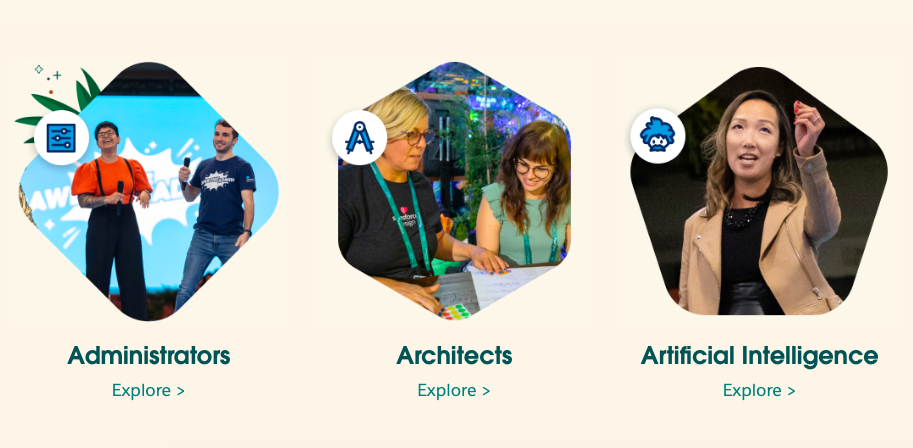
How to Start Using AI to Stage Exceptional Events
In events, we always have to be thinking ahead of the curve and imagining what could be next to enhance the experience for our attendees. There are dozens of new AI tools being released daily and we can expect a lot of exciting developments for the events industry, but it can be overwhelming knowing where to begin. So where should we start with implementing this technology in our events?
Currently, there aren’t many custom-built tools for specific use cases in events, and using this technology often requires technical skills or an understanding of APIs and data integration which can be daunting. Rather than trying to run an entire event with AI, we recommend starting on a smaller scale and introducing affordable, accessible tools like ChatGPT to support your event planning processes.
Perhaps it's as simple as writing some marketing email copy variations for your different audience segments or estimating the catering requirements for your events based on historical data. There are many guides to writing prompts on ChatGPT and other text-based AI tools to help you get the most accurate and relevant results. You can also go more in-depth with Google's courses on getting to grips with Generative AI.
Once you've started to become more familiar with tools like this, you can start to look at incorporating more events-focused tools that can help manage budgets and critical plans - even build entire websites for events. Over the next few months, we're sure there'll be huge improvements to AI to make tools more user-friendly and open to everyone - and if you want a sidekick to help you out, look into AgentGPT and God Mode which break down your requests into sub-tasks automatically, like an AI autopilot!
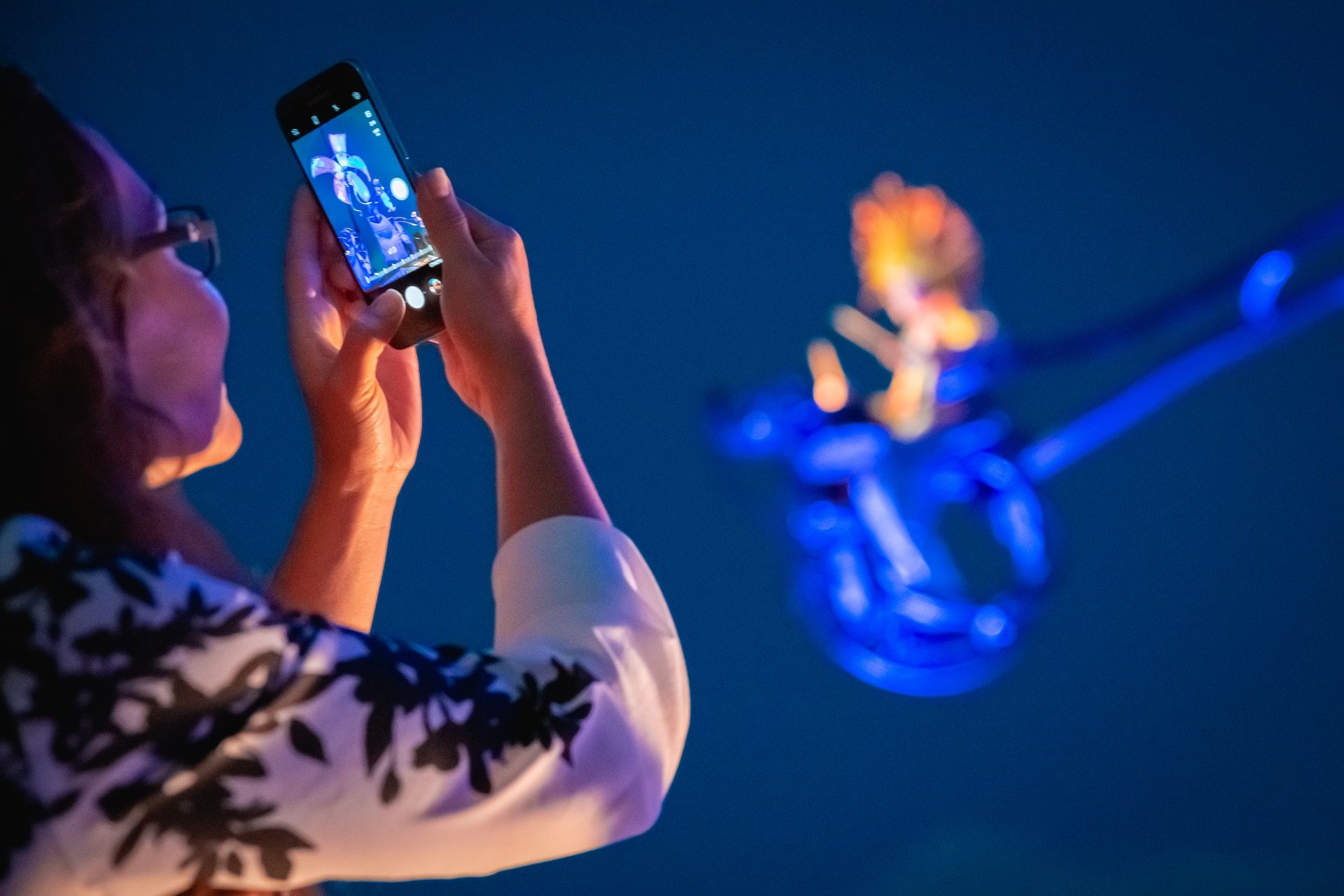
Tools to have on your Radar for Planning Events
Content creation
ChatGPT
Function: Text creation, chatbot automation, answering queries
Application: Generating event descriptions, content, schedules etc. and answering attendee queries
Jasper AI and Copy AI
Function: Producing curated copy
Application: Content creation and copywriting for event marketing
Audio and visual generation
DALL-E 2, Midjourney, Fotor, and Canva
Function: Image generation
Application: Creating custom event visuals from text descriptions
Soundraw
Function: Music and audio creation
Application: Producing event soundtracks and royalty-free music for promotional videos
Lumen5 and HeyGen
Function: Video creation
Application: Making event highlight videos
Beautiful.ai
Function: Slide deck creation
Application: Designing conference keynote presentations
Social media
Sprinklr and Devi.ai
Function: Social listening
Application: Gathering audience insights and analysing trends
Event logistics
PredictHQ
Function: Demand forecasting
Application: Calculating staff and catering requirements etc.
Translation and transcription
Descript
Function: Podcast and audio transcription,
Application: Transcribing event panels and content sessions
KUDO and Interprefy
Function: Translation and captioning
Application: Live speech and captioning in hundreds of languages
Chatbots and customer support
LiveChat and LivePerson
Function: Chat support
Application: Providing real-time chat assistance to event attendees
The Future Outlook: AI's Potential Impact on the Events Industry
AI isn’t just a buzzword, and it’s not a passing fad; it's a game-changer that can revolutionise the way we stage exceptional events. From resource planning to generating the content, implementing sustainability, emphasising accessibility, and ensuring security in events, AI's potential impact on all areas of events can’t be overstated.
AI is a rapidly evolving field, and with predictions showing that it’s going to explode across industries in the next couple of years, it’s going to be pivotal in keeping events at the pinnacle of businesses’ marketing channels. And with competition for attendees becoming ever stronger, the more tools you have in your arsenal to make your events truly exceptional, the better!
To stay ahead of the curve in this fast-moving time for the events industry, we recommend trying out some of the above suggestions in your own event planning and marketing - we love to hear real-world examples from eventprofs so let us know how you’re using AI in your events!
Stay in the loop
Keep abreast of updates in the industry with our newsletter, designed to keep you posted on all things events.
Sign me up!
Author

Gemma Baker
Gemma loves all things social media and keeps busy by creating lots of Hire Space content. When she’s not creating content, you'll find her shopping, exploring or at the gym!
